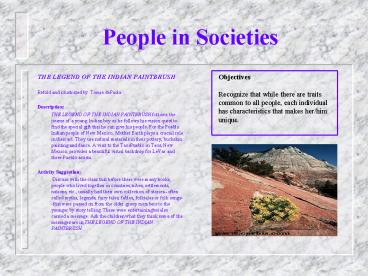People in Societies PowerPoint PPT Presentation
1 / 8
Title: People in Societies
1
People in Societies
- THE LEGEND OF THE INDIAN PAINTBRUSH
- Retold and illustrated by Tomie dePaola
- Description
- THE LEGEND OF THE INDIAN PAINTBRUSH follows the
journe of a young Indian boy as he follows his
vision quest to find the special gift that he can
give his people. For the Pueblo Indian people of
New Mexico, Mother Earth plays a crucial role in
their art. They use natural materials in their
pottery, buckskin painting and dance. A visit to
the TaosPueblo in Taos, New Mexico, provides a
beautiful visual backdrop for LeVar and three
Pueblo artists. - Activity Suggestion
- Discuss with the class that before there were
many books, people who lived together in
countries,tribes, settlements, nations, etc.,
usually had their own collection of
stories--often called myths, legends, fairy
tales, fables, folktales or folk songs--that were
passed on from the older group members to the
younger by story telling. These were
entertainingbut also carried a message. Ask the
children what they think some of the messages are
in THE LEGEND OF THE INDIAN PAINTBRUSH.
Objectives Recognize that while there are traits
common to all people, each individual has
characteristics that makes her/him unique.
2
American Heritage
- FOLLOW THE
- DRINKING GOURD
- Author Illustrator Jeanette Winter
- Description Based on the song "Follow the
Drinking Gourd", this show explores an infamous
chapter in America's history. As he celebrates
the road to freedom paved by the Underground
Railroad, LeVar introduces viewers to the
history, heroes, stories and music of the
African-American culture which emerged from
slavery. - Activity Suggestion Have the student retell Peg
Leg Joe's involvement in helping slaves to
freedom. Examine the book illustrations to find
the special mark he left to guide escaping
slaves. What might have happened to Peg Leg Joe
and other helpers on the underground Railroad if
the slave owners discovered their activities?
What might have happened to the slaves?
- Objective
- Listen to and discuss stories that reflect the
cultural heritage of the United States-past and
present, real and fictional.
3
World Interactions
- The Roles of Weather
- and Landscape
The Effects of Blizzards
Objective Describe the physical and
human characteristics of places in the community.
The Effects of Drought
4
World Interactions
- The Roles of Weather and Landscape
Activity Mini Tornado Students will construct
a mini tornado using two 2-liter bottles, a
plastic connector, red food coloring, and a house
from the game of Monopoly. Spinning the bottle
will demonstrate the rotating motion of a tornado
(simulating low pressure) as well as the
centrifugal power of the storm. The red food
coloring will help highlight the water/air
currents and the hotel will simulate the way in
which landforms are effected by the extreme
winds.
5
World Interactions
- Objective
- Explore how people in the local community and in
communities around the world depend upon the
environment.
FARMING
6
World Interactions
- The Great Dust Bowl
- Throughout the second half of the nineteenth
century, American farmers overcultivated their
land. As a result, the 16 feet of topsoil that
predated European settlement of the United States
was reduced to sand.
7
World Interactions
- Objective
- Demonstrate that a map represents a real place.
Colorado
Washington
Activity
After using various senses to explore a relief
map, students will construct their own relief map
using glue, rice, styrofoam, and paint. Students
will then be asked what types of activities
take place on their land based upon the nature of
its surface (farming, mining, fishing, etc).
8
(No Transcript)

